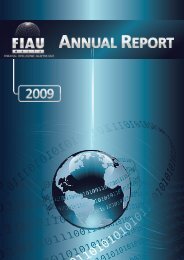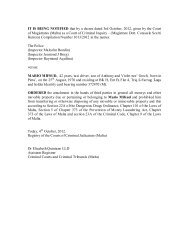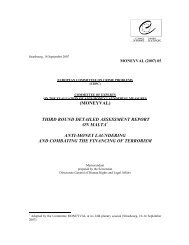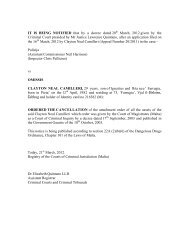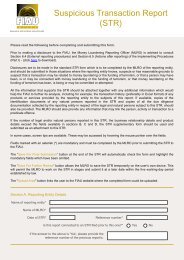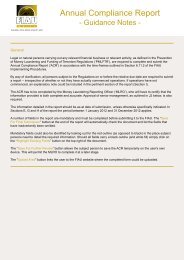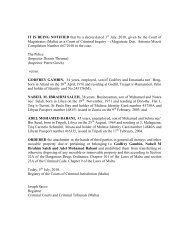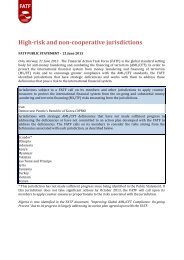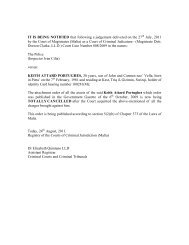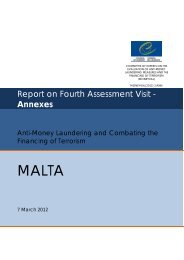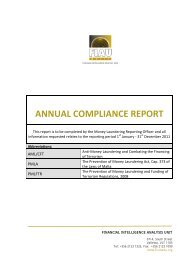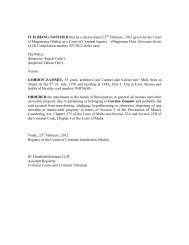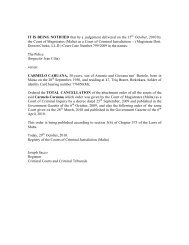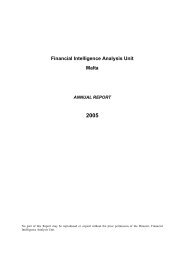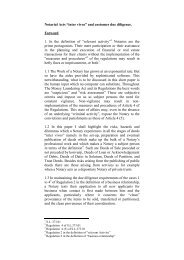FIA U ANN U AL REPOR T 2011 - Financial Intelligence Analysis Unit
FIA U ANN U AL REPOR T 2011 - Financial Intelligence Analysis Unit
FIA U ANN U AL REPOR T 2011 - Financial Intelligence Analysis Unit
You also want an ePaper? Increase the reach of your titles
YUMPU automatically turns print PDFs into web optimized ePapers that Google loves.
who had smuggled 400 grams of cocaine into Malta had<br />
been intercepted by the Police. One of the two persons<br />
was in fact subsequently accused of drug trafficking and he<br />
admitted to the charges. The Police claimed that there was<br />
a link between the accused and these two persons since<br />
they shared various telephone numbers on their mobile<br />
phones.<br />
In the course of the proceedings, the Police alleged that<br />
a number of inconsistencies which emerged during the<br />
interrogation indicated that the explanations provided by<br />
the accused had been fabricated. This further convinced the<br />
Police that the accused might have been involved in criminal<br />
activities, especially attempting to launder funds which had<br />
been illicitly obtained by trafficking drugs, either himself or<br />
by a third party.<br />
Indeed, for instance, the accused claimed that he had come<br />
to Malta to purchase gold. However, the Police determined<br />
that the accused knew very little about gold and had only<br />
visited one jewellery shop in Malta.<br />
In order to shore up his assertion that he had come to Malta<br />
to purchase gold, the accused stated that he had purchased<br />
a one-way airline ticket from Brussels to stay in Malta for as<br />
long as necessary to conduct his business. However, it was<br />
established by the Police that as soon as he had checked in<br />
at the hotel in Malta he had confirmed that he would stay<br />
for one night only. Additionally, on the next day he bought<br />
an airline ticket to return to Brussels.<br />
As to the provenance of the undeclared cash that he was<br />
found carrying, he alleged that such funds constituted the<br />
earnings from his employment as a taxi driver in Rotterdam.<br />
Nevertheless, the Police received information from the<br />
Dutch authorities that he had been unemployed for a<br />
number of years and that the registration number of the taxi<br />
he had provided to the Police did not exist.<br />
Furthermore, after being questioned by the Police in relation<br />
to a previous conviction handed down by a court in Italy,<br />
the accused attempted to mislead the Police by stating that<br />
the conviction related to the possession of a false passport<br />
when in fact it related to a drug trafficking offence.<br />
Notwithstanding the fact that no direct link had been<br />
established between the undeclared cash and the drug<br />
trafficking, the circumstances surrounding the case<br />
seemed to provide a strong indication that the accused had<br />
attempted to launder money by physically carrying illegally<br />
obtained cash from Malta to another country.<br />
On the basis of the facts before it, the Court of Magistrates<br />
examined the provisions of Article 2(2)(a) of the PMLA<br />
which states that a person may be convicted of a money<br />
laundering offence even in the absence of a judicial finding<br />
of guilt in respect of the underlying criminal activity, the<br />
32<br />
Annual Report <strong>2011</strong><br />
existence of which may be established on the basis of<br />
circumstantial or other evidence, without it being incumbent<br />
on the prosecution to prove a conviction in respect of the<br />
underlying criminal activity. The court of first instance, in<br />
fact, did agree that insofar as the prosecution proves to<br />
the satisfaction of the Court that the funds derive from a<br />
criminal activity, it is not necessary to prove a conviction in<br />
relation to such criminal activity.<br />
The Court then referred to the mental element of the<br />
offence of ML and to the specific reference in the law<br />
that knowledge or suspicion that the money derives from<br />
a criminal activity must be proven. Since the existence of<br />
the offence of ML is dependent on the proof of this specific<br />
mental element, the court was of the view that the onus to<br />
prove that the accused knew or suspected that the money<br />
derived from a criminal activity fell on the prosecution. The<br />
Court went on to quote Article 3(3) of the PMLA, which<br />
states that in proceedings for the offence of ML where<br />
the prosecution produces evidence that no reasonable<br />
explanation was given by the accused showing that the<br />
money was not money derived from a criminal offence, the<br />
burden of showing the lawful origin of such money would<br />
lie with the accused.<br />
In relation to this article, the Court stated that although<br />
the burden of proof is shifted from the prosecution to the<br />
accused, ultimately it is the prosecution which will have<br />
to prove whether an offence was committed and that the<br />
accused was guilty of such offence. This does not amount<br />
to a derogation from the presumption of innocence. It was<br />
held that the prosecution has to prove to the satisfaction<br />
of the Court other facts which are related to the actual<br />
laundering of the funds involved and other links to the<br />
underlying criminal activity. Additionally, it would be up<br />
to the prosecution to prove that the financial position of<br />
the accused was not compatible with the amount of funds<br />
that the accused was in possession of. It is only after an<br />
examination by the judge or magistrate of the reasonable<br />
explanation on the provenance of the funds that the burden<br />
of proof can shift.<br />
The Court emphasised that the shifting of the burden of<br />
proof on the accused is the exception not the rule and is<br />
limited to those cases where it is reasonable to expect the<br />
accused to provide certain evidence which the prosecution<br />
would otherwise never be in a position to provide. The<br />
Court further stated that the duty of the accused to provide<br />
a reasonable explanation of the provenance of the funds is<br />
owed to the Court and not to the prosecution. Therefore,<br />
the Court concluded that the shifting of the burden of proof<br />
is legal and achieves a fair balance.<br />
As to the evidence put forward by the prosecution, the<br />
defence argued that notwithstanding the fact that the<br />
prosecution had succeeded in proving that the accused did<br />
not have a clean police record and had been involved in drug



